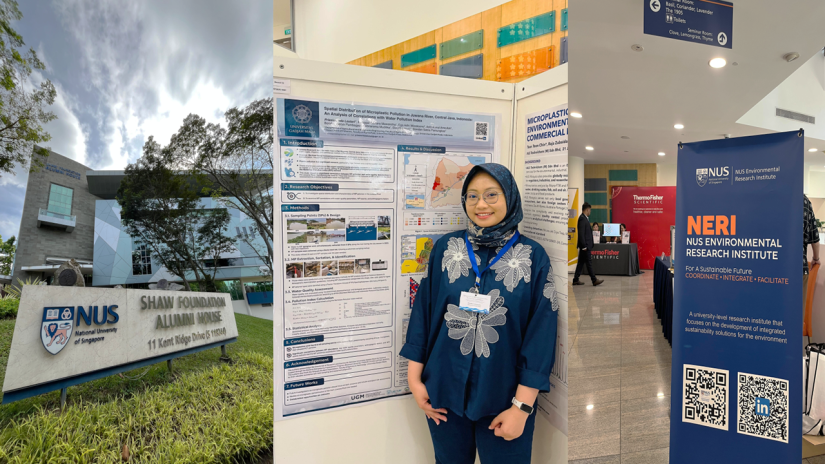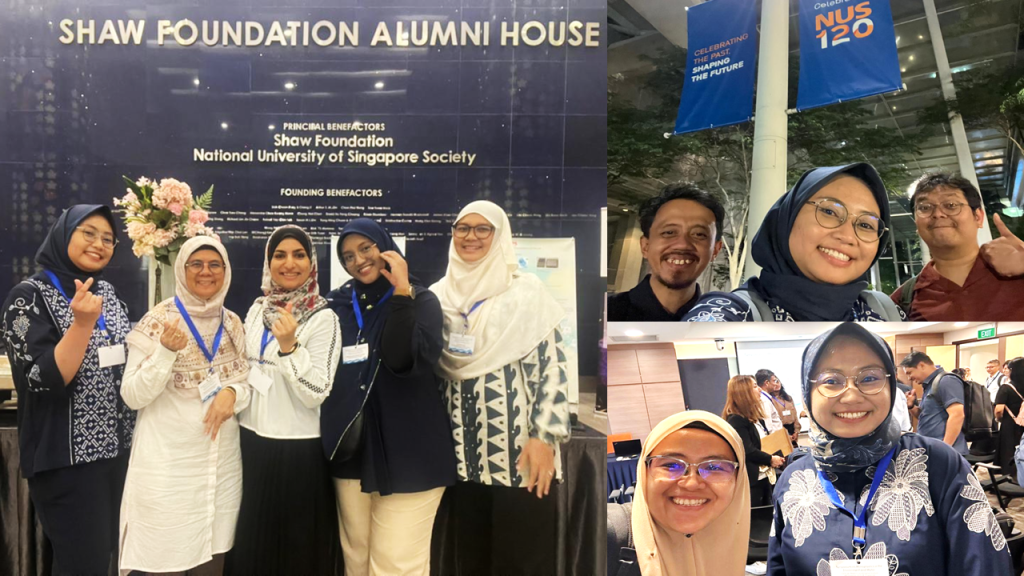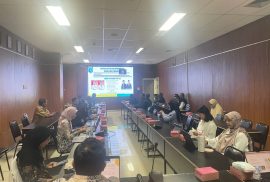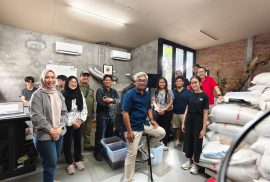
Singapore, September 18–19, 2025 — Plastic pollution, now detected in nearly all environmental compartments, has emerged as a critical environmental issue and a global threat to human health. This issue has intensified with the rising trends of plastic production and consumption, which are not accompanied by adequate waste management, leading to the leakage of plastic waste into the environment. Over time, these plastics degrade and fragment into microplastics, plastic particles smaller than 5 mm. Microplastic pollution has become a serious concern, not only for ecosystems but also for human health, and is now classified as an emerging environmental contaminant.
To address this challenge, the National University of Singapore (NUS) Environmental Research Institute (NERI), in collaboration with the NUS Centre for Water Research and The SG Lab Forum, organized the Symposium on Microplastics in the Environment and Water: Challenges, Research, and Mitigation Strategies (MP Symposium 2025), held at the NUS Shaw Foundation Alumni House, Singapore. The symposium aimed to tackle microplastic pollution through collaboration and synergy among academics, scientists, researchers, industry professionals, policymakers, and government agencies.
The main objectives of MP Symposium 2025 were to strengthen understanding, foster multidisciplinary collaboration, and promote collective efforts to mitigate the impacts of microplastics, including discussions on removal technologies. The event also featured live demonstrations of advanced laboratory instruments supporting microplastic research, presented by several sponsors, including Agilent Technologies, Frontier Laboratories, JEOL Asia Pte. Ltd., Thermo Fisher Scientific, Bruker Optics, and Scientific Procurement Pte. Ltd. The symposium was supported by NUS (Suzhou) Research Institute and Singapore Oceanarium, as part of NUS Sustainability Connect.

The MP Symposium 2025 was attended by over 90 participants (oral and poster presenters) from 14 countries, including Singapore, South Korea, Taiwan, Japan, Thailand, Malaysia, Indonesia, China, the Philippines, India, Bangladesh, Italy, the United Kingdom, and Australia. On this occasion, Dr. Prieskarinda Lestari, a lecturer from the Department of Agricultural and Biosystems Engineering (DTPB), Faculty of Agricultural Technology, Universitas Gadjah Mada (UGM), had the honor of participating as a Poster Presenter. Remarkably, she was the only Indonesian-affiliated microplastic researcher represented at this scientific forum.
Dr. Prieskarinda presented a poster titled “Spatial Distribution of Microplastic Pollution in Juwana River, Central Java, Indonesia: An Analysis of Correlations with Water Pollution Index.” The study revealed that all sampling points along the Juwana River contained microplastics with varying abundances, predominantly characterized by large-sized (1–5 mm), transparent, fiber-shaped particles identified as PET polymers. The findings also indicated a correlation between microplastic pollution and the river’s water pollution index — a concerning issue considering the Juwana River’s role as a source of clean water, irrigation, and aquaculture activities. The study highlights the potential ecological risks posed by microplastic contamination across environmental compartments — from river systems and agricultural lands to human health — aligning with the scope of agricultural and biosystems engineering research.

During the symposium, Dr. Prieskarinda engaged in brief discussions and networking sessions with keynote speakers and fellow participants.
(Left photo) — Dr. Prieskarinda Lestari with Prof. Jiangyong Hu, Director of the Research Cluster in Environmental Sustainability and the Centre for Water Research, Department of Civil and Environmental Engineering, NUS; Director of the Environmental Engineering Programme; and Deputy Director of NUS Environmental Research Institute, along with Yudha Dwi Prasetyatama, Ph.D (Cand.), a DTPB lecturer currently pursuing his doctoral studies at NUS.
(Center photo) — Dr. Prieskarinda with Prof. Atsuhiko Isobe (Kyushu University, Japan), a keynote speaker at MP Symposium 2025, and Dr. Lai Yoke Lee, Senior Associate Director, NUS Environmental Research Institute (right photo).

(Top right photo) — Dr. Prieskarinda with Mr. Yudha and Mr. Rega Permana, a lecturer from Universitas Padjadjaran currently pursuing his Ph.D. at the University of Birmingham, UK.
(Bottom right photo) — Dr. Prieskarinda with Assoc. Prof. Sabiqah Tuan Anuar from Universiti Malaysia Terengganu.
Participation in MP Symposium 2025 provided valuable insights, the latest research updates, potential collaborations, motivation, and benchmarks for the advancement of international microplastic studies. This opportunity also strengthened academic networking and collaboration across countries.
Dr. Prieskarinda’s participation not only demonstrates her active individual contribution to the advancement of science and technology but also reinforces the academic and research presence of DTPB FTP UGM in the global microplastic pollution and water resource management arena. Moreover, it underscores the department’s competence in addressing strategic environmental and water-related issues, fostering collaborative solutions to global challenges, and affirming Universitas Gadjah Mada’s international standing in achieving the Sustainable Development Goals (SDGs) — particularly SDG 4 (Quality Education), SDG 5 (Gender Equality), SDG 6 (Clean Water and Sanitation), SDG 12 (Responsible Consumption and Production), SDG 13 (Climate Action), SDG 14 (Life Below Water), and SDG 17 (Partnerships for the Goals).
Contributor: Prieskarinda Lestari




